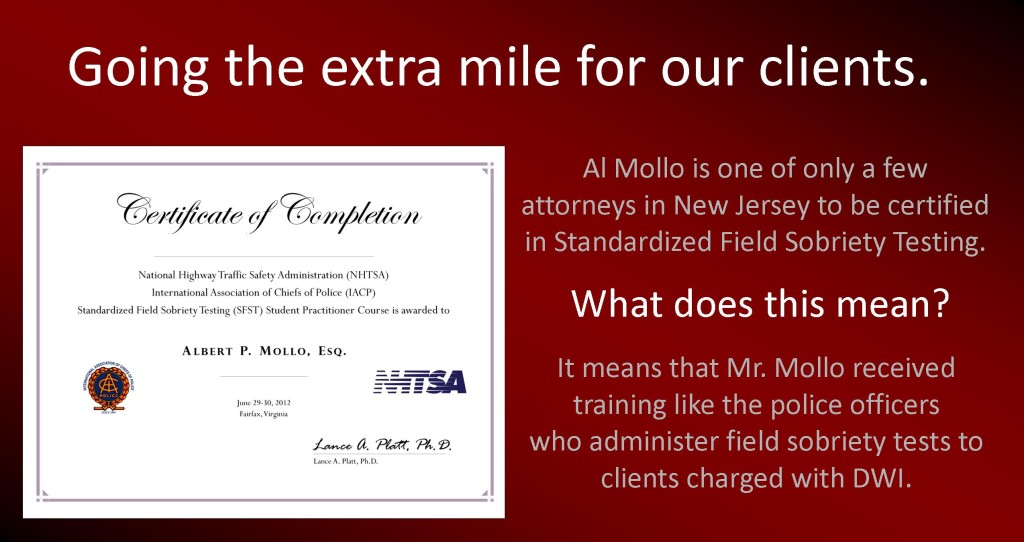New Jersey DWI Field Sobriety Tests
Field sobriety tests are conducted after a driver is pulled over when the police officer suspects intoxication. The officer will ask the driver to perform certain physical or cognitive tests to determine sobriety. The National Highway Traffic and Safety Administration (NHTSA) has established guidelines in an effort to make these evaluations more reliable.
Our firm is specialized in evaluating DWI field sobriety tests. In fact, attorney Al Mollo is one of only a few attorneys in the State of New Jersey to be certified in administration of the field sobriety tests.
Some of the standard tests administered are:
The One-Leg Stand Test: The police officer asks the suspect to raise one foot off the ground in an effort to assess ability to maintain balance and follow instructions. The suspect is told to count out loud, look down, point toes out and keep arms at his or her sides during the test. If a suspect stops the test prematurely, puts his or her foot down, does not count out loud, or use arms for balance, the officer may draw an inference of intoxication.
Walk and Turn Test: The Walk and Turn test also assesses a suspect’s ability to maintain balance and follow instruction. It is considered a divided attention test. Put differently, a suspect must listen to and follow instructions while performing a physical task. In theory, it will be difficult for an intoxicated driver to adequately multi-task in this regard.
At the start of the test, the officer will ask the suspect to listen to instructions. Police reports often note that defendants had difficulty paying attention to the instructions. The officer then asks the suspect to take nine heel-to-toe steps forward, pivot, and then take nine heel-to-toe steps back. The officer will also request that the suspect count aloud the number of steps taken.
Signs of intoxication include: missing steps, taking an incorrect number of steps, difficulty maintaining balance, turning incorrectly, and failing to count steps out loud. If a suspect uses his or her arms for balance or does not complete the test, the officer will determine this to be a failure to successfully perform the test.
Horizontal Gaze Nystagmus (HGN) Test: One common tactic used by police to detect intoxication is the horizontal gaze nystagmus test, or HGN test. While New Jersey does not consider this test to be sufficiently reliable to prove intoxication at trial, the State can nevertheless cite poor performance on this test as probable cause grounds for the arrest. During the HGN test, the officer will ask as a suspect to look at an object (usually a pen). The object is moved back and forth, and the suspect is asked to follow it with his or her eyes. The officer is watching the eyes of the suspect in an effort to detect a lack of smooth pursuit. If nystagmus (the jerking of the eyes) is detected, the officer may conclude that the suspect is under the influence.
Arresting officers may also administer other, non-standardized field sobriety tests. These include other balance tests, counting, reciting the alphabet and touching finger-to-nose.
click for an instant consultation


